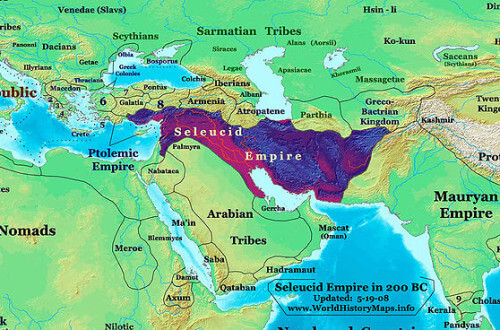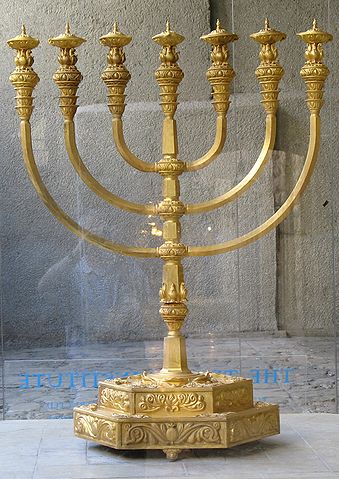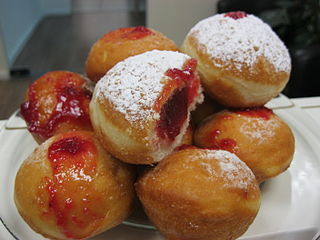Ricochet is the best place on the internet to discuss the issues of the day, either through commenting on posts or writing your own for our active and dynamic community in a fully moderated environment. In addition, the Ricochet Audio Network offers over 50 original podcasts with new episodes released every day.
 What Is Hanukkah?
What Is Hanukkah?
From the standpoint of Jewish law, Hanukkah is a relatively minor holiday. The book of Maccabees did not make it into the canon of the Hebrew Bible. The Talmud devotes entire tractates to the Sabbath, Passover, Rosh HaShanah, Yom Kippur, Sukkoth, even Purim — but Hanukkah is discussed over only a few pages. Of that, only a few lines are devoted to the festival’s origins. They begin with the uncharacteristic question (BT Shabbat 21b), “What is Hanukkah?”
The holiday’s history begins in the wake of Alexander the Great’s death. Alexander’s empire was carved up by his generals. Seleucus presided over Babylonia initially, but quickly expanded his territory through conquest. His son Antiochus I inherited a vast Seleucid empire that stretched from Turkey to India.

The Seleucid Empire in 200 BC. Author: Thomas A. Lessman. Source: https://commons.wikimedia.org/wiki/File:Seleucid-Empire_200bc.jpg
In 200 BCE, Antiochus III conquered Judea from the Ptolemaic dynasty in Egypt. Wanting to pacify the Jewish population, he took a hands-off approach to governance. The Jews were permitted to “live according to their ancestral customs” and manage their internal affairs. During his reign, they did so reasonably well, despite tensions between Jewish traditionalists and Jewish Hellenizers. However, upon Antiochus III’s death in 175 BCE, his son Antiochus IV determined to exercise tighter control. Antiochus IV appointed a Jewish High Priest of his choosing to rule Judea, then replaced him with a different one, and ultimately began an aggressive program of Hellenization in 170 BCE. This involved suppression of traditional Jewish thought and practice, often through violence. He plundered the Temple in Jerusalem, and stopped the services there.
Matters came to a head in 167 BCE. Antiochus IV outlawed such core Jewish activities as brit milah (ritual circumcision) and teaching Torah — anything connected to the propagation of the Jewish faith. The Temple in Jerusalem was transformed into a temple to Zeus, and deliberately defiled with sacrificial offerings of pigs. The punishment for refusing to participate in the pagan rites was death.
The book of Maccabees tells of how a Seleucid officer set up an altar in the city of Modi’in, home to the Hasmonean family of Jewish Priests. The officer turned to Mattathias, the Hasmonean patriarch, to be the first to sacrifice a pig to Zeus. Mattathias made a display of refusing. When another Jew stepped forward to volunteer, Mattathias went into a rage. He killed the volunteer, then turned on the officer and killed him too. He shouted to the assembled crowd, “Let everyone who has zeal for the Torah and who stands by the covenant follow me!” And so began a Jewish rebellion.
The fighting was led by Mattathias’s five sons, in particular Judah, who was nicknamed, “The Maccabee” (i.e., “The Hammer”). The small band of Maccabees waged a guerrilla campaign against the well-organized, well-trained, and well-equipped Seleucid army, and eventually reconquered Jerusalem in 165 BCE. Hanukkah literally means, “dedication”; it commemorates the reconquest and rededication of the Temple.

Replica of the Temple menorah, made by The Temple Institute. Source: https://commons.wikimedia.org/wiki/File:Menorah_0307.jpg
It is at this point in the narrative that the Talmud steps in to answer its question. The Hasmoneans removed anything that had been used in pagan worship from the Temple, and began to restore the daily Jewish service there for the first time in five years. Central to that service is the lighting of the menorah, the seven-branched candelabra that stood in the Temple courtyard. According to the Talmud, the Maccabees scoured the Temple in search of undefiled, pure olive oil with which to light the menorah, but they found only one small flask, with oil sufficient for only a single day. It would take eight more days to press new oil suitable for the menorah. The Hasmoneans went ahead and lit the menorah anyway, and a miracle happened: The oil that should have lasted one day burned for eight, until new oil could be pressed.
Thus today’s two central observances of the eight-day festival: The lighting of the Hanukkah menorah, and the recitation of Hallel, a collection of Psalms of praise. The Hanukkah menorah has eight branches, plus a shamash or “servant” candle. One light is lit the first night, two the second, and so on, until all eight are lit on the last night. The menorah must be placed visibly — in a doorway or window — in order to publicize the miracle. It is customary to eat foods fried in oil, such as potato pancakes (latkes) and jelly donuts (sufganiot).

Classic Hanukkah sufganiot. Source: http://commons.wikimedia.org/wiki/File:Classic_Hanukkah_sufganiyot.JPG
Skeptical scholars note that the miracle of the oil, unmentioned in the book of Maccabees or by Josephus, is convenient for the Rabbis of the Talmud (who came 500-600 years later); Jewish law prohibits the formal celebration our enemies’ downfall, and particularly military victories. Modern academic scholars speculate that the menorah lighting developed from pagan winter solstice rites, and/or celebrations of the annual olive harvest and pressing.
Regardless, the holiday is known (and referred to by Josephus) as “The Festival of Lights”. The menorah is the core symbol of the holiday, and a core message of the holiday is God’s mastery over nature. A daily prayer insertion during Hanukkah thanks God “for the miracles”, saying,
And You, in Your great mercy, stood by [the Maccabees] in their time of woe;
You fought their battles, You judged their just cause, You exacted their vengeance;
You delivered the strong into the hands of the weak, and the numerous into the hands of the few, and the impure into the hands of the pure, and the wicked into the hands of the righteous, and the apostates into the hands of those who keep Your Torah;
and You made a great and holy name for Yourself in Your world;
and for Your people Israel, You made a great salvation and relief….
Although this prayer omits mention of the oil, it still suggests a Hanukkah miracle: The Jews’ most unnatural victory over a more powerful foe, against overwhelming odds.
A close reading of this prayer reveals another important message. The Jews were a majority in the land of Israel; how is it that we celebrate the victory of “the few” over “the numerous”? A clue is given by the mention of victory over “apostates”. The Maccabees’ fight was not merely a war of liberation, but also a civil war. The Hellenizing Jews — who were a plurality, and perhaps even a majority — had decided that traditional Judaism was culturally backwards, and that Hellenization was the modern way. They sided with the Seleucids. Hanukkah recalls not only a military triumph, but also one of Jewish traditionalism over assimilation.
In modern Israel, Hanukkah resonates even among irreligious Jews as a celebration of the restoration of Jewish sovereignty by a plucky band of Jewish fighters. Among religious Jews, the intramural fight also resonates; Modi’in today lies halfway between pious Jerusalem and cosmopolitan Tel Aviv.
In America, however, the Jew-0n-Jew aspect of the holiday’s history is little-noted. It offers a rich irony, since Hanukkah’s proximity to Christmas makes the pull of assimilation especially strong. Gift-giving on Hanukkah is a practice unique to modern America. Likewise Hanukkah decorations. Public schools make a point of introducing Hanukkah customs to students alongside Christmas customs, and singing Hanukkah music in “holiday” performances. Among intermarried families, it’s not uncommon to light a Hanukkah menorah alongside a Christmas tree in a celebration of their diverse cultural heritage. There is an annual menorah lighting at the White House.
But by transforming Hanukkah into little more than the Jewish form of the celebration of the season, American Jews have reshaped the holiday in direct opposition to its focus on cultural independence and exclusivity. Hanukkah is not Judaism’s holiday of peace on Earth, joy to the world, and goodwill to all. (Judaism does celebrate those themes, but not on this particular holiday.) What is Hanukkah? Hanukkah is Judaism’s holiday of purity. It is a holiday of Jews’ refusal to compromise or to accept second-best in worshiping God. It is a celebration of the power of Jews’ steadfast, zealous adherence to the truth of Torah and the Jewish way of life. For Hanukkah teaches that when Jewish commitment is real, God will bend nature, if necessary, to support and sustain it.
Published in General




The accounts of the Maccabees formed the Office of Readings at the end of the Catholic Church’s year in late November…The fervency and joy came through and reminded me of you, iWc, Kay and others here…Thanks for this!
We’ll that said Happy Hanukkah SOS . Thanks for the history.
More like this.
Particularly nice that the traditional conservatives triumphed over the progressive Hellenists.
Thank you for this excellent history and description of the place of Hanukkah in the Jewish life.
Thank you for this enlightenment (double meaning!)
I too like that Tradition is praised and celebrated here. May the miracle shine brighter each night you the light the candles.
Many thanks. We were just going over this material about the division of Alexander’s empire with Maedel at the breakfast table last week. Happy Hanukkah to your and yours!
I had to take a brief break in the middle for some jelly donuts but I came right back because this was interesting stuff.
Love the lesson on the “reason for the season” so to speak. Another shining post, SoS (to follow in Pencilvania’s pun-ish footsteps).
Thanks for the well wishes! (And thanks to everyone who read all the way to the end….)
I agree, I’m all about any holiday that condones the eating of fried foods and doughnuts, especially of the jelly variety.
Always good to get the actual history behind events, rather than the holiday-ized (I know, I verbed a noun) version. Great post and hope it gets picked up for the main feed.
Thank you, SoS. Illuminating (ha!) and heartening!
Thanks, SOS. Very informative.
Have a blessed Hanukkah!
Maccabees also introduced the idea of offering prayer and sacrifice for the dead. I found those books to be fascinating.
My kids have a children’s book that tells the story of the Maccabees in rhymes. The one line that book keeps repeating is:
The “and do it too” part is what is usually lacking. At the time of the Maccabees people were willing to turn their back on the G-d of Israel and His word because they were afraid they would be killed. Today in America many churches and synagogues willingly reject G-d’s word in favor of political correctness. It is time for the “few” to start doing it too.
You know, you could edit this post each day of Hanukkah with a new picture. I love the picture of the children lighting the candles. :)
Holidized…google it. Not necessarily a real word, but real hits from a search engine.
Son of Spengler, may your Dreidl never cease spinning.
Khag Sameach!
And next time I go to Dunkin Donuts, or a British bakshop, and want Jelly Donuts, or Jammy Donuts, I’ll ask for Sufganiot.
I just posted the invitation to our Chanukiah videoconference this coming Wednesday on the Member Feed.
Son of Spengler, if you go to Zion Lutheran Church on Light Street in Baltimore, I am pretty certain that you’ll find a wall tile in the courtyard that refers to the events celebrated in Chanukkah.
And when you make it to Baltimore, then you are staying with us!
On second thought it might be referring to the Parable of the Wise and Foolish Bridesmaids.
Here’s a link to the church’s page about the Mercer Tiles (The Bible In Tile)
The tile may in fact refer to Chanukkah.
http://www.zionbaltimore.org/vtstones_mercer_tiles_1_main.htm
Mainfeed awesomeness. :)
And a new spelling of
ChanukiahChanukkahHanukkah each day!Ah! A Chanukiah is the menorah we light on Chanukah.
As for spelling… it is all transliteration anyway. A Chappy Channuqa to Jew!
Thank you for this link. The tiles are wonderful.
Two spellings: חֲנֻכָּה or חנוכה
My preferred transliteration is Ḥanukkah, FWIW ;-)
Yes, I plan to start early on the donuts!
The candle picture was the work of an editor. Those kids are cute, aren’t they?